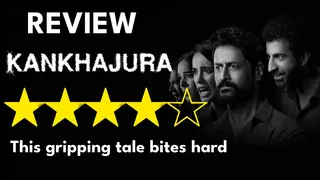'The Roses' Review: Benedict Cumberbatch & Olivia Colman shine in a marriage story that trips on its ending
Colman, as always, balances biting wit with an undercurrent of melancholy, while Cumberbatch’s slightly aloof energy perfectly suits a man who cannot quite keep up with his wife’s success.
Published: Friday,Aug 29, 2025 03:30 AM GMT+05:30

The Roses
In theaters
Cast: Benedict Cumberbatch, Olivia Colman, Andy Samberg, Kate McKinnon, Alison Janney & more
Directed by: Jay Roach
Rating - ***1/2 (3.5/5)
Marital strife has rarely looked this polished. The Roses, Jay Roach’s glossy new adaptation of Warren Adler’s The War of the Roses, trades the vicious dark comedy of the 1989 Michael Douglas and Kathleen Turner film for something gentler, sunnier, and more ambivalent. With Benedict Cumberbatch and Olivia Colman leading the charge, the film has plenty of bite in its dialogue, warmth in its performances, and sparkle in its design. Yet, for all its craft, it never decides whether it wants to be a domestic satire or a tragicomic meltdown, and its wavering tone leaves the ending feeling oddly unsatisfying.
The setup is deliciously promising. What begins as a sharp, clever portrait of two British expats trying to find love and identity in California slowly turns into a marital tug-of-war, but one that never feels as dangerous or emotionally combustible as it should. The result is an engaging but inconsistent film, buoyed by its cast and visual flair, that ultimately shies away from its darker impulses.
A New Meet-Cute for a Familiar Story

Unlike the Douglas-Turner original, which plunged almost gleefully into the toxicity of its central relationship, this version opens on a sweeter, more restrained note. Theo Rose, played by Cumberbatch with an air of self-absorbed charm, is an architect already frustrated by compromises in his latest UK project.
In a moment of cinematic serendipity, he stumbles into the kitchen of a fancy restaurant and encounters Ivy, Colman’s disenchanted chef with dreams of striking out on her own in San Francisco. Their banter, prickly yet playful, sets the stage for what initially feels like a romantic comedy more than a black comedy.
Cut forward ten years and the Roses are firmly entrenched in their Californian dream. They share two children, a coastal home, and careers that seem to balance each other out. Theo’s ambitious maritime museum design is about to be unveiled, while Ivy is running a modest seafood restaurant that reflects her personal touch.
The storm that literally destroys Theo’s grand project serendipitously elevates Ivy, when a stranded food critic finds himself in her restaurant and ignites her ascent into culinary fame.
Success, Sacrifice, and Growing Fractures

The film cleverly shifts gears three years later, showing Ivy’s humble kitchen blossoming into a booming restaurant franchise while Theo retreats into domestic life, raising the kids with an almost militant zeal for nutrition and discipline.
There are witty touches here, as he transforms their sugar cravings into protein shakes and sports victories, even securing them a scholarship. For a while, this inversion of traditional roles seems like the basis of a thoughtful exploration of ego, ambition, and compromise within marriage.
What keeps this portion of The Roses lively is the chemistry between Cumberbatch and Colman. Their repartee is layered with sarcasm, affection, and little digs that feel recognisably British even as they baffle their American friends.
Their interactions are funny in ways that feel lived-in, never just played for laughs. This stretch of the film maintains a buoyant, sometimes touching rhythm, creating the impression that even with disagreements, these two will find a way to soldier on.
Comedy That Outshines the Conflict

Roach surrounds the pair with an energetic supporting cast. Andy Samberg, Kate McKinnon, and Zoë Chao turn up as comedic friends who try to mimic the Roses’ banter, rarely succeeding. Allison Janney, in just one scene as a ferocious divorce lawyer, nearly steals the film.
Yet, for all the eccentric flavour these actors bring, the humor that lands best remains in the hands of Colman and Cumberbatch, whose dry, caustic delivery elevates even mundane lines.
And this is where the movie begins to show its tonal cracks. For nearly three-quarters of its runtime, it functions as an acerbic marital comedy. The Roses are flawed but reasonable, witty but not cruel.
Even their sessions with a marriage counselor, which could easily veer into slapstick, feel amusing rather than despairing. At this point, the story is not a war but a tiff, one that still feels resolvable with effort.
A Sudden Leap into Chaos

Then comes the final act. Abruptly, the film remembers that its source material is about a marriage turned gladiatorial. Without enough buildup, Theo and Ivy are suddenly enemies, tearing at each other in elaborate, violent gags that are played in montage rather than with real dramatic weight. Instead of escalating tension, what we get feels like a half-hearted attempt to check a box.
This tonal shift is jarring. The early scenes establish Theo and Ivy as rational people, not unhinged caricatures. So when the climax suggests they might kill each other, it does not ring true.
Worse still, the violence is softened into quirky comic beats rather than something unsettling or cathartic. The finale briefly finds its footing again by pulling the focus back to their relationship, but the credibility has already been stretched thin.
Don't get me wrong, I am well aware about the original's tonality but here, when you have established the mood and tonality in a certain way, the final act and the outcome seems dispersed, if not anything else.
A Visual Feast
If there is one element that consistently dazzles, it is the film’s design. Not what you say for relationship dramas usually, I know. Theo’s coastal mansion, which becomes a kind of battleground, is a marvel of production design, all sweeping lines and vast windows framing the Pacific.
Cinematographer Jim Denault captures both the intimacy of kitchen spaces and the grandeur of Californian vistas with equal precision. Even when the story falters, the movie looks exceptional, its visuals giving it a sheen well beyond the average romantic comedy.
Performances that Keep the Film Afloat

At the center of it all, Colman and Cumberbatch carry the movie. Colman, as always, balances biting wit with an undercurrent of melancholy, while Cumberbatch’s slightly aloof energy perfectly suits a man who cannot quite keep up with his wife’s success.
Together, they create a dynamic that is believable and endearing, even when the script pushes them into implausible territory. Their scenes with the children are especially touching, bringing small but effective moments of humanity to the film.
The kids themselves get one of the film’s best sequences, a quick video call where they nonchalantly celebrate their parents’ decision to divorce. It is a blink-and-miss moment that captures the film’s sharper instincts: humor and sadness existing in the same beat, without being overstated.
The Problem with the Ending

I reiterate but a bit differently greatest frustration with The Roses is that it asks us to invest in two people who, for all their flaws, are portrayed as thoughtful, even tender, throughout most of the movie. When their disagreements escalate into cartoonish near-murder, it feels out of character and dramatically false.
Watching a couple claw at each other can make sense if the film establishes that trajectory, but here the pivot is too abrupt. To then walk it back into reconciliation not only strains credibility but risks trivialising the darkness it briefly flirted with.
Ordinarily, even a botched ending does not erase the pleasures of a well-crafted buildup, and that remains true here. The screenplay is sharp, the pacing brisk, and the performances magnetic enough to carry us through. It is just a pity that the final act stumbles into melodrama that the rest of the movie did not earn.
Final Thoughts
Despite its faltering climax, The Roses still offers enough pleasures to warrant a watch. The script sparkles in its first two acts, Jay Roach demonstrates a keen eye for detail, and the cast, led by Colman and Cumberbatch, turn in performances worth savoring. The film’s treatment of its children is handled with surprising subtlety, and its humor often lands in unexpected ways.
It may not reach the feral dark comedy heights of Danny DeVito’s 1989 film, but it is a clever, witty, and occasionally moving exploration of ambition, compromise, and the inevitable cracks that appear in even the most loving marriages.
In the end, The Roses is not exactly rosy, but it is a comic showcase dressed up as a domestic drama, and at its best moments, it reminds you why watching Olivia Colman and Benedict Cumberbatch spar is reason enough to show up.
Olivia Colman and Benedict Cumberbatch headline Jay Roach’s glossy reimagining of The War of the Roses, now simply called The Roses. What begins as a witty marital comedy about love, ego, and ambition slowly unravels into chaotic mayhem. With dazzling performances and stunning design, the film entertains but falters in its final act. Read the full review here.
Join Our WhatsApp Channel
Stay updated with the latest news, gossip, and hot discussions. Be a part of our WhatsApp family now!
Join NowYour reaction
 Nice
Nice Great
Great Loved
Loved LOL
LOL OMG
OMG Cry
Cry Fail
Fail

















Post a comment